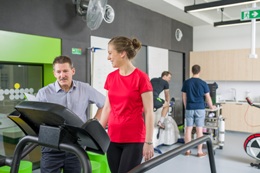15 April 2014
 The University of South Australia will unveil its new state-of-the-art High Performance and Exercise Physiology Clinic at City East campus on Thursday.
The University of South Australia will unveil its new state-of-the-art High Performance and Exercise Physiology Clinic at City East campus on Thursday.
The clinic is set to enhance performance among elite athletes while also providing exercise therapy for those with chronic conditions.
In combination with the University’s human performance laboratories, which include an environmental chamber, body composition and gait and movement analysis measurement systems, the clinic adds a further important facility for teaching and research at the University, and widens the scope to offer performance testing and assessment for elite athletes, as well as members of the public for rehabilitation.
Head of UniSA’s School of Health Sciences Professor Roger Eston says the clinic has been developed to provide the best facilities in two important areas of research and education at the University.
“The clinic encompasses both new infrastructure and an innovative approach to providing services in the areas of clinical exercise physiology and physical performance testing,” he says.
“It really puts UniSA at the forefront of education and service provision in human physical capacities, providing support clinics and laboratory monitoring for people with chronic conditions, exercise therapies for rehabilitation, through to sports science expertise and testing facilities for high-performance athletes.
“It looks sensational, delivers a dedicated first-class research space for clinical services and sports science, and accommodates postgraduate students who are our future specialised workforce.”
Prof Eston says the clinical exercise physiology section of the clinic follows the development of the University’s Bachelor of Clinical Exercise Physiology degree.
“Clinical exercise physiology is the fastest-growing allied health profession,” Prof Eston says.
“In 2013 the demand for our then brand new degree was extremely high. This year it gained even more momentum and the intake has essentially doubled after just one year.
“The Exercise Physiology component of the clinic will service the community and play a significant role in allowing our students to experience first-hand exposure to clinical practice.”
In the clinical exercise physiology area, there are four consulting rooms, examination areas, muscle function testing equipment, ECG monitoring equipment, and lung function and blood testing for key health risk factors.
Equipment in the high performance area includes: an isokinetic strength testing dynamometer, which monitors torque curves (strength) across the full range of motion of specific muscle groups of the arms, shoulders, hips and legs at various fixed speeds; a system for measuring oxygen uptake, heart rate, frequency and depth of breathing; and equipment for tracking changes in body composition and anthropometry with training programs.
“We can test a range of physical capacities including the maximum performance of various energy systems, strength measures as well as many other systems that are important to monitor in elite athletes,” Prof Eston says.
Media note: The official launch of the High Performance and Exercise Physiology Clinic will be held on Thursday April 17 at 10.30am at City East Campus, Centenary building, Level 2.
Media contact: Kelly Stone office 8302 0963 mobile 0417 861 832 email Kelly.stone@unisa.edu.au




